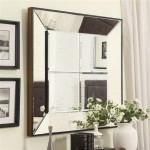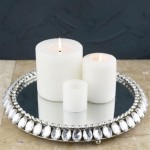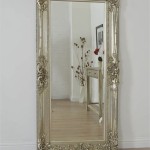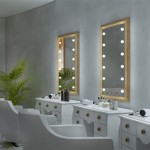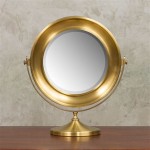Traditional Wall Mirrors: Decorative and Functional
Traditional wall mirrors offer more than just a reflection; they serve as decorative focal points, enhancing the aesthetics of any space. Their timeless appeal stems from classic designs and intricate craftsmanship, making them versatile additions to various interior design styles. Whether antique or inspired by historical periods, traditional mirrors contribute a sense of elegance and sophistication.
Reflecting Historical Elegance
Traditional wall mirrors often draw inspiration from specific historical periods, such as Victorian, Baroque, or Art Deco. Victorian mirrors, for instance, frequently feature ornate frames with intricate carvings, often depicting floral motifs or cherubs. Baroque mirrors showcase elaborate gilded frames with curvaceous designs and acanthus leaf details. Art Deco mirrors embrace geometric patterns and streamlined silhouettes, reflecting the era's emphasis on modernism and symmetry. Understanding these historical influences allows for informed selection and placement of traditional mirrors within a specific decorative scheme.
Frame Styles and Materials
The frame is a defining feature of a traditional wall mirror. Materials range from wood and metal to resin and plaster. Wooden frames can be carved, painted, or gilded, offering a variety of textures and finishes. Mahogany, walnut, and oak are popular choices for their rich tones and durability. Metal frames, often crafted from brass, bronze, or wrought iron, introduce a touch of metallic sheen and can feature intricate filigree work. Resin and plaster frames allow for the creation of highly detailed and ornate designs at a potentially lower cost than carved wood or metal.
Frame shapes also contribute to the overall aesthetic. Oval and rectangular shapes are common, but circular, arched, and sunburst designs also appear in traditional styles. The frame's profile, whether flat, convex, or concave, further enhances its visual impact. Choosing a frame that complements the existing furniture and décor creates a cohesive and harmonious look.
Placement and Functionality
Beyond their decorative value, traditional wall mirrors serve practical purposes. Strategically placed mirrors can brighten a room by reflecting natural light, making spaces appear larger and more airy. In hallways or entryways, they provide a quick glimpse for personal grooming before leaving the house. Over a fireplace mantel, a large traditional mirror can serve as a striking centerpiece, anchoring the room's design.
The size and shape of the mirror should be considered in relation to the surrounding space. A large, ornate mirror can overwhelm a small room, while a small, understated mirror might get lost in a grand setting. The mirror's placement should also take into account the reflection it will capture. Positioning a mirror opposite a window or a visually appealing piece of art can enhance the beauty of the room.
Incorporating Traditional Mirrors into Different Design Styles
While inherently traditional, these mirrors can complement a variety of interior design styles. In a classic or traditional setting, they reinforce the established aesthetic. In a more contemporary space, a strategically placed traditional mirror can introduce a touch of timeless elegance and serve as a contrasting element, adding depth and visual interest. Even in minimalist settings, a simple, framed traditional mirror can add a touch of warmth and sophistication without overwhelming the overall design.
Mixing and matching different styles of traditional mirrors can also create a curated and eclectic look. For example, pairing a Baroque mirror with a simpler, more streamlined Victorian mirror can create an interesting interplay of textures and shapes. However, it's important to maintain a sense of balance and cohesion to avoid a cluttered or disjointed appearance.
Care and Maintenance of Traditional Mirrors
Preserving the beauty of a traditional wall mirror requires proper care and maintenance. Regular dusting with a soft cloth is essential to prevent the buildup of dust and grime. For more thorough cleaning, a mild glass cleaner and a soft, lint-free cloth can be used. Avoid harsh chemicals or abrasive cleaners, which can damage the frame or the mirror surface. For antique mirrors or those with delicate frames, consulting a professional restorer is recommended for any significant cleaning or repairs.
Proper handling is also crucial. When moving a traditional mirror, it's important to support the frame and avoid putting pressure on the glass. Hanging a heavy mirror requires appropriate hardware and secure wall anchors to prevent damage to the mirror or the wall.

Modern Traditional Wall Mirrors Taryn Whiteaker Designs

Kate And Laurel Kinsman 24 00 In W X 36 H Gold Rectangle Traditional Framed Decorative Wall Mirror 224987 The Home Depot

Kate And Laurel Berkshire 24 00 In W X 36 H Gold Capsule Traditional Framed Decorative Wall Mirror 224437 The Home Depot

Traditional Wall Mirrors You Ll Love In 2024 Homary

Wall Mirrors The Decorative Company Mirror Dining Room Decor Living

Beaumont French Traditional Wall Mirror Solid Wood Frame In Multiple Finish Options Ornate High Quality

Kate And Laurel Arendahl 21 00 In W X 31 37 H Gold Arch Traditional Framed Decorative Wall Mirror 223710 The Home Depot

Mirrors Traditional Decorative Landscape Mirror Gold 122 W X81cm H Yearn

Buy 999 Multicolor Rectangular Mdf Traditional Of Pattern Printed Wall Decorative Mirror 14 Inch X 20 Mirrors56 At Best S In Jiomart
Hqijun Wall Mirror Window Decorative Traditional Mirrors 30 36 1 2 Gold

